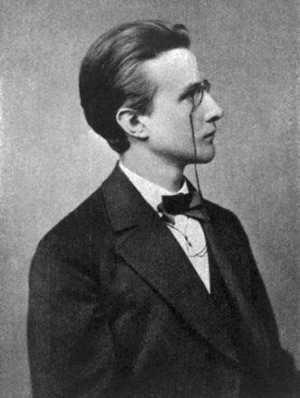Max Planck (nonfiction)
Max Karl Ernst Ludwig Planck, FRS (/plɑːŋk/; 23 April 1858 – 4 October 1947) was a German theoretical physicist whose discovery of energy quanta won him the Nobel Prize in Physics in 1918.
Planck made many contributions to theoretical physics, but his fame as a physicist rests primarily on his role as the originator of quantum theory, which revolutionized human understanding of atomic and subatomic processes.
Planck was gifted when it came to music. He took singing lessons and played piano, organ and cello, and composed songs and operas. However, instead of music he chose to study physics.
The Munich physics professor Philipp von Jolly advised Planck against going into physics, saying, "in this field, almost everything is already discovered, and all that remains is to fill a few holes." Planck replied that he did not wish to discover new things, but only to understand the known fundamentals of the field, and so began his studies in 1874 at the University of Munich.
In 1877 he went to the Friedrich Wilhelms University in Berlin for a year of study with physicists Hermann von Helmholtz and Gustav Kirchhoff and mathematician Karl Weierstrass. He wrote that Helmholtz was never quite prepared, spoke slowly, miscalculated endlessly, and bored his listeners, while Kirchhoff spoke in carefully prepared lectures which were dry and monotonous. He soon became close friends with Helmholtz. While there he undertook a program of mostly self-study of Clausius's writings, which led him to choose thermodynamics as his field.
With the completion of his habilitation thesis, Planck became an unpaid private lecturer (Privatdozent) in Munich, waiting until he was offered an academic position. Although he was initially ignored by the academic community, he furthered his work on the field of heat theory and discovered one after another the same thermodynamical formalism as Gibbs without realizing it. Clausius's ideas on entropy occupied a central role in his work.
In April 1885 the University of Kiel appointed Planck as associate professor of theoretical physics. Further work on entropy and its treatment, especially as applied in physical chemistry, followed. He published his Treatise on Thermodynamics in 1897. He proposed a thermodynamic basis for Svante Arrhenius's theory of electrolytic dissociation.
In 1889 he was named the successor to Kirchhoff's position at the Friedrich-Wilhelms-Universität in Berlin – presumably thanks to Helmholtz's intercession – and by 1892 became a full professor.
In March 1887 Planck married Marie Merck (1861–1909), sister of a school fellow, and moved with her into a sublet apartment in Kiel. They had four children: Karl (1888–1916), the twins Emma (1889–1919) and Grete (1889–1917), and Erwin (1893–1945).
After the apartment in Berlin, the Planck family lived in a villa in Berlin-Grunewald, Wangenheimstrasse 21. Several other professors of Berlin University lived nearby, among them theologian Adolf von Harnack, who became a close friend of Planck. Soon the Planck home became a social and cultural center. Numerous well-known scientists, such as Albert Einstein, Otto Hahn and Lise Meitner were frequent visitors. The tradition of jointly performing music had already been established in the home of Helmholtz.
After several happy years, in July 1909 Marie Planck died, possibly from tuberculosis. In March 1911 Planck married his second wife, Marga von Hoesslin (1882–1948); in December his fifth child Hermann was born.
During the First World War Planck's second son Erwin was taken prisoner by the French in 1914, while his oldest son Karl was killed in action at Verdun. Grete died in 1917 while giving birth to her first child. Her sister died the same way two years later, after having married Grete's widower. Both granddaughters survived and were named after their mothers. Planck endured these losses stoically.
In January 1945, Erwin, to whom he had been particularly close, was sentenced to death by the Nazi Volksgerichtshof because of his participation in the failed attempt to assassinate Hitler in July 1944. Erwin was executed on 23 January 1945.
As a professor at the Friedrich-Wilhelms-Universität in Berlin, Planck joined the local Physical Society. He later wrote about this time: "In those days I was essentially the only theoretical physicist there, whence things were not so easy for me, because I started mentioning entropy, but this was not quite fashionable, since it was regarded as a mathematical spook".
His name is also known on a broader academic basis, through the renaming in 1948 of the German scientific institution, the Kaiser Wilhelm Society (of which he was twice president), as the Max Planck Society (MPS).
In the News
Fiction cross-reference
Nonfiction cross-reference
External links:
- Max Planck @ Wikipedia
